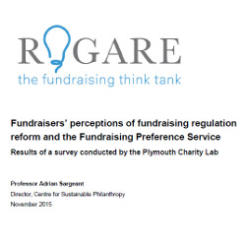A Fundraising Preference Service could cost the sector £2bn and the majority of fundraisers are against its introduction, according to a report by the Centre for Sustainable Philanthropy’s think tank Rogare.
The survey questioned 524 people about the introduction of a Fundraising Preference Service or a new fundraising regulator.
It found that respondents predicted a fall of 17 per cent in fundraising revenue, based on the FPS and other measures, and said that other research by Rogare suggested a 20 per cent drop.
It said these figures equated to around £2bn a year.
Some 76.7 per cent of the survey’s 524 respondents said they were not in favour of an FPS.
Almost half of respondents – some 46.3 per cent – said fundraisers should actively oppose suggestions of its introduction.
Another 35 per cent were also opposed, but said fundraisers should “accept that it is happening and try to influence it”.
Over half of all respondents – 55.4 per cent – said they would try to persuade their chief executive and senior management teams to speak up against the introduction of the FPS.
Other responders said that a “mix of welcoming and influencing” was needed.
One commenter said: “the problem I forsee with the FPS is once you are on it, you may always be on it, missing out on supporting organisations you might wish to support.”
Another questioned if the FPS would lead to confusion: “Do you not thinkthat the MPS, TPS and FPS is likely to lead to confusion? Are individuals going to get to opt out of certain charities and not other?”
One responder said the FPS was a “nonsensical knee jerk measure that has been proposed as a disproportionate attack on the charity sector by those who do not understand the social implications of the FPS”.
Respondents favour new regulator
Many respondents were in favour of the creation of a new fundraising regulator.
Some 37.8 per cent of respondents said a new fundraising regulator was “necessary”, while 8.2 per cent said it was “very necessary”.
Almost half of the survey's respondents were in favour of a regulator funded by a membership fee, where the fee was related to the size of the charity – at 43.7 per cent. But 26.5 per cent of respondents said it should be funded “entirely by central government”.
The highest percentage of respondents worked for organisations with an income of between £1m and £4.9m – at 26.2 per cent – while some 24.5 per cent of respondents worked for health and medical research charities.









